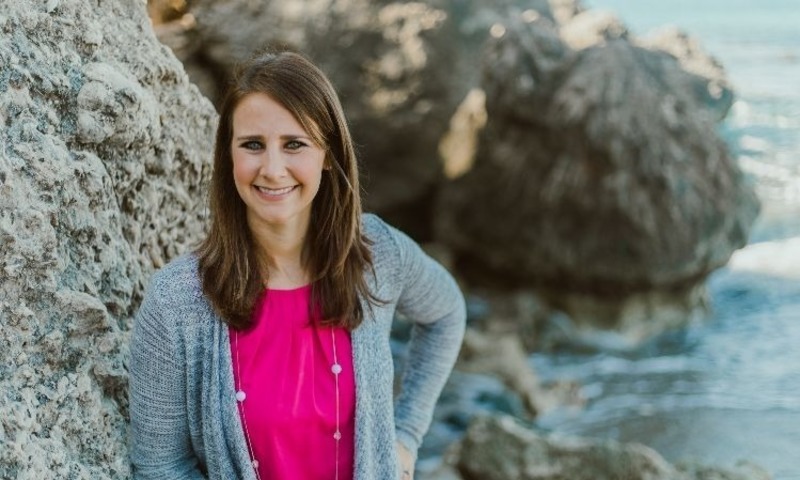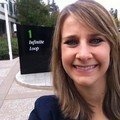What is your current position and role at Apple? What interests you about this industry?
I am a DevOps Engineer and Technical Project Manager on the Content Delivery Network (CDN) team at Apple. The reason I have two titles is that I love both the business and engineering side of tech (and it's Apple, so we don't really have formal titles anyway!). I'm grateful that I have the privilege to do both roles in a single position. While at Apple, I have traveled to data centers across the world to install servers and set up networking infrastructure, coded new tools for our team, improved processes and organized team communications. I get to enjoy a mix of business and engineering.
The CDN team enables customers around the world to quickly download and access apps, movies, music, and content from Apple. I have worked at Apple through its huge growth period, and it's been an exciting place to be, specifically on the network side. When I started at Apple, my team didn't exist. When people ask me what I will be doing in five years, I tell them I don't know, because it probably hasn't been invented yet. Creating a network that allows people around the world to access Apple's content in seconds is amazing. I love how quickly technology changes, and how innovative my team can be in implementing ideas that have never been done before.
Talk a little about your giftedness. How and when did you discover what you’re good at?
It has been a journey to determine what I'm good at, and something that I'm continually adding to. I've always felt like a "jack of all trades, master of none." Specifically, at Apple, that realization has been challenging for me, because there are so many people here who are experts in their fields.
However, first and foremost, I am an organizer. From the time I was two years old — when my mom came in during naptime and found me lining up my books and shoes along the wall, color coordinated — to my time in school, where I had my class notes tagged and searchable in my digital Evernote notebook, I've always been someone who likes to make lists and keep things organized. I wasn't quite sure how this would translate into a job until I was offered my internship at Apple (after I had worked for four years, and then did my MBA, so it was about six years after college!). I talked with my dad about the role Apple was offering me as a project manager. I wasn't sure it was a good fit for me, and he said, "Of course it is! You've been doing this your whole life. You organize parties and events with people, lead groups of people to make good decisions, make things happen and you are reliable. This is the role for you."
So one way I've discovered my gifts has involved listening to friends, family, coworkers, bosses. It is really helpful to ask coworkers or bosses as they see what differentiates you from others on the team. After each of my rotations at Apple (I was a part of four teams during my first two years at Apple, in the IT Development Program), I would ask my boss to point out my strengths and areas where I could grow. After a few rotations, the same things kept popping up. Generally, your strengths are especially noticeable within the first few months, because once you join the team, in some way, you disrupt the team norms, and this disruption can point out your unique gifts.
A second way I've learned what my strengths are has been by observing where I am frustrated with other people. As a project manager at Apple, I was supposed to keep things on schedule and organized (my strengths!) but the people who were part of the project were regularly late, disorganized and unreliable. I was able to become less frustrated when I realized that being diligent, reliable, organized and resourceful were my key strengths, and it was the reason I had my job; because the other people on the team were not gifted in those areas, I was the person to pull the team along to success, due to my unique skills.
A third and major way I identified my gifts was through being a resident assistant at Biola. My resident director went through the StrengthsFinder book with us, and that helped me qualify what my strengths were. I always knew that I liked to read and go to class and study (a.k.a. nerd!), but I didn't realize that was one of my strengths: Learner. Having words to define who I knew I always was increased my confidence in myself and allowed me to see that I was unique and needed to use these gifts with which God had equipped me.
I have found that, in different areas, industries or roles, different strengths of mine shine through. Sometimes it takes a certain environment for my underlying skills to shine through. When I am with people who have similar strengths, it is harder for me to discern where I am uniquely gifted. However, in a heterogeneous environment, it's very evident where I stand out, and that has helped me understand my strengths. If something "just makes sense" to you, and it takes others longer to get it, then you've narrowed in on one of your strengths.
Keeping track of it all: As a list maker, I keep a note in Evernote (my favorite brain dump/file organizer tool!) of my strengths. I started this in college to start learning about myself. In job interviews, many times recruiters will ask you what your strengths are, and I wanted to make sure I can clearly articulate them.
Learner: Always learning, improving, growing and pushing others to grow and make things better.
Responsibility/Discipline: If I say it will get done, you better believe it will be on your desk by the time I committed.
Resourceful/Resilient: When people run into a "wall," many people stop. I say, "There is a multitude of ways to get through a wall: over, under, around, through, with a trampoline, with a ladder, shooting yourself out of a cannon,” etc. "If there's a will, there's a way." That's me. I have the will to make it happen, so I'll find a way.
Communication: I learned that this was a strength of mine through my time in tech. Although I was friendly and focused on creating community throughout college, I was (and still am) an introvert. I wasn't the person who would chat with friends for hours, so in college, I assuredly would not have said that communication was my strength. However, I learned that in the tech world, where communication can be horrible, I am seen as a very gifted communicator: I make sure that the business people understand the technical people (acting as what I like to call "the bridge"), and I ensure that all the stakeholders in my projects are kept abreast of any issues or concerns. These are definitely components to having great communication skills; I just never realized that I was better than others at it. If I were in a marketing department, my communication skills may not be seen as a strength because more people would be good at it. However, in the area where I work, these skills are not as common, so it's more substantially noticeable.
How has your education at the Crowell School of Business and Biola equipped you for your work? Talk about “business as ministry” and how this manifests itself in your work today.
The business skills I learned at Crowell prepared me well for my top-10 MBA program, and I was thoroughly delighted with this. The fact that Christian education and deep, biblical teaching can be combined with an excellent, quality business education, is one of the reasons I am so grateful for my time at the Crowell School of Business.
There are four different ways I see my work and ministry intersecting:
- "Direct" ministry: Preaching the gospel, hosting Bible studies, encouraging others, service activities (what people think of when they think of "ministry" at work).
- Being bold in standing up for what is true, noble, right, pure, lovely, admirable, excellent (Phil. 4:8).
- Honoring God by using my skills and talents well (Col. 2:23–24).
- Caring for and loving others around me.
When many people think of ministry at work (including myself in the past), they think of Bible study or actively witnessing to people. According to this definition, my involvement with Apple Christian Fellowship (ACF) most directly relates. I was the co-chair of ACF for the 2015–16 year. ACF hosts weekly lunchtime Bible studies and different training events for our members. We are one of the human resources' diversity groups, so we partner with HR to welcome new employees to the company and help them get involved with our established members. We provide a weekly devotional email that discusses our work at Apple and our faith (written by our members), and an email forum where people can share verses and encouragement. After watching the documentary, The Insanity of God, I knew we had to find a way to bring it to Apple. So we hosted a film screening and did a Q&A with the movie producers, missionaries Nik and Ruth Ripken. These are the types of things that ACF brings to help expose people to Jesus at Apple.
All of this is really neat. It's amazing when new employees join the company and find out that there are many Christians working at Apple, and they're not alone. It's very impactful to be able to counsel other Christians and pray for them in small groups at lunch. I was so blessed to be able to lead this group of 1,000 worldwide Christians at Apple. Without Apple’s name behind me, it would have been very difficult to get a pre-release screening of The Insanity of God and to connect with the busy missionaries who produced it. By being a Christian, specifically working at Apple, I was able to proclaim God's glory and bless our company with the screening of this very Christian movie.
However, this wasn't my core job. I felt like I was doing ministry on the side, not as a part of my job, even though the ministry work was with my employer. While working on ACF projects, I felt like I wasn't doing my "real" job (the co-chair position was approved by my boss to take 10 hours of work time each week, but it was still a volunteer job). After I completed my year as co-chair, I started to think more deeply about work as ministry. I remembered many of the conversations we had at Crowell where we talked about God being pleased with our work, even if during that specific day, we weren't sharing the gospel or leading a Bible study. At that time, and still, now, it was hard for me to internalize this, but I started to really look into the idea of, "How could I do my actual engineering work for the glory of God?”
Through this process, I have seen many ways that, living with a kingdom mindset, calling people to a higher standard (with their words and actions), holding them accountable to what they say, and doing good work is glorifying God and definitely is considered ministry. I believe it is crucial for Christians to be running companies and helping guide our corporations with a Christian mindset, due to the tremendous impact our organizations make in the world. To be in a role where I can realistically have a great influence, I need to ensure I'm working hard to be a great engineer and manager. In the midst of this diligent work, I will continue to participate in our on-campus Bible study small group and cultivate relationships with my coworkers, caring for the people that God has placed around me and being a light where I have been placed.

 Biola University
Biola University


.jpg)
.jpg)
